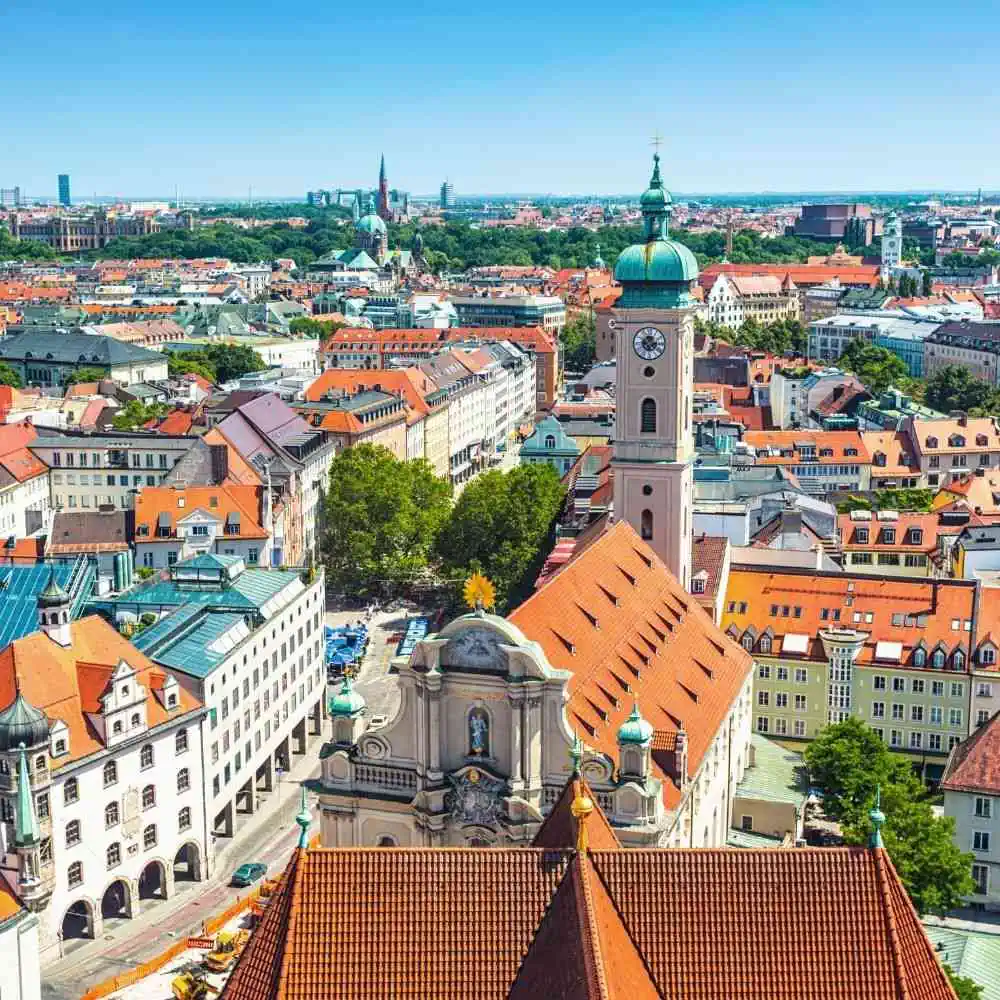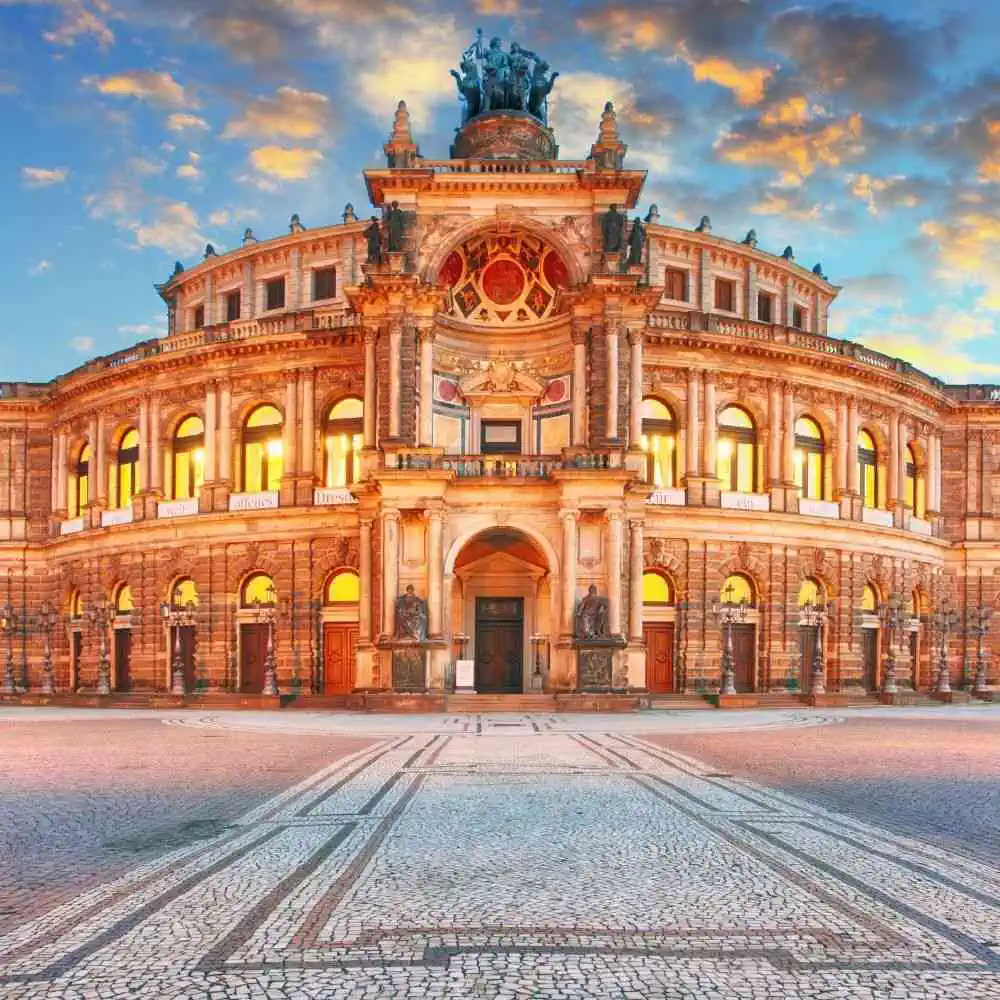You will depart from Dresden Hbf, located right in the city center of Dresden, and enjoy the beautiful scenery of the journey while you arrive in Munchen Hbf, also located in the heart of Munich.
Trains from Dresden to Munichfrom € 55.00
Trains from Dresden to Munich
Travelling by train: Dresden - Munich
Discover the Journey from Dresden to Munich!
This journey is filled with historical sites, stunning landscapes, and interesting stops. Whether it’s your first time in Europe or you’ve been there a few times, this ride is sure to make your trip memorable as you cover a distance of 460 km in a total of 4 hours and 40 minutes.
The journey begins by boarding the Regional Express from Dresden Hauptbahnhof station towards Munich. Along the way, you'll pass through cities such as Leipzig, Hof and Nürnberg, as well as some charming towns, which gives you plenty of time to take in the panoramic views of the Bavarian countryside.
As you arrive at the Munich Hauptbahnhof station, make sure to look out for the impressive Gothic Cathedral of Our Lady, the most iconic item that can be seen from the station.
On the Dresden-Munich route, you'll also get to visit some of the most beautiful cities in Germany such as Würzburg, Erlangen, and Bamberg. And in Bamberg, visit the Old Town Hall, one of the most famous and oldest examples of German architecture.
Whether you want to experience the history, culture, or landscape of Germany, the Dresden-Munich route will surely satisfy your needs!

Journey details
How long does the train from Dresden to Munich take?
The journey time can vary, but on average, the train takes approximately 6 hours to travel from Dresden to Munich.
What is the fastest journey from Dresden to Munich by train?
The fastest train journey from Dresden to Munich is around 4 hours and 30 minutes.
How much does the train cost from Dresden to Munich?
The price for a train ticket from Dresden to Munich varies, but it typically starts from €39 if booked in advance.
How much does the Dresden to Munich?
Yes, there are direct trains available from Dresden to Munich, providing a convenient travel option without the need for transfers.
What is the distance from Dresden to Munich by train?
The distance from Dresden to Munich by train is approximately 460 Km.
Which are the cities that the train stops from Dresden to Munich?
The train from Dresden to Munich often stops in major cities such as Leipzig, Nuremberg, and sometimes Ingolstadt, depending on the route taken.
Buy train tickets from Dresden to Munich
Traveling by train from Dresden to Munich is an easy and comfortable journey. RailClick is the best way to travel Europe by train.
Dresden: Places to see
Dresden, located in the eastern part of Germany on the Elbe River, is a city full of history, art and culture. With that in mind, here are seven of the best places to visit in Dresden.
Zwinger Palace: this Baroque palace is a must visit in Dresden. Built in the 18th century, it is the perfect example of courtly architecture and landscaping. Its interior galleries and courtyards are home to sculptures, porcelain collections and the old masters. The palace is located in the heart of the city, open from 10am-6pm daily, and has an admission fee of €7.
Semper Opera House: a National Monument of Germany located in Dresden's inner city, it is a top-notch example of German Neo-Renaissance architecture. The opera house is home to the renowned Staatskapelle Dresden and the Semperoper Ballet. It is open from 10am to 5pm and tickets start from €7.
Frauenkirche: this iconic Lutheran church was built in the late 18th century and is one of the city's most famous landmarks. The interior is adorned with sculptures and frescoes, while the exterior is a symbol of the city’s unity. The church is open from 10am to 6pm daily and admission is free.
Albertinum: this is the State Art Collections of Dresden and home to some of the city's finest art. It houses paintings, sculptures and photographs from the Middle Ages to modern art. The museum is open from 10am to 6pm daily and admission is free.
Brühl's Terrace: this baroque terrace is located between the Elbe and the Augustus Bridge and is one of the most beautiful spots in Dresden. Once used as a royal court garden, it offers stunning views of the city's skyline. It is open from 10am to 8pm daily and admission is free.
Green Vault: located in the Royal Palace Dresden, the Green Vault is the largest treasure chamber in Europe. It is home to an impressive collection of precious stones, jewelry and coins. The museum is open daily from 10am to 6pm and admission is €7.
Royal Palace Dresden: this palace is one of the most important buildings in the city, built in the Baroque style. It was the home of the rulers of Saxony and is now a museum with its own gardens. The museum is open from 10am to 6pm daily and admission is €8.
When visiting Dresden, you can enjoy the city's magnificent culture and architecture while sampling local food such as sausages, schnitzel, and beer. With its monuments, churches, gardens and museums, Dresden is a must-visit destination for every history and art enthusiast.

Munich: Places to see
Munich (München), in Germany is a fascinating destination that offers visitors a blend of city delights, lively culture, and rich historical and architectural gems to explore. From soaring cathedrals to beautiful parks to world-famous beer halls, there is something for everyone in this Bavarian city. Here is a list of seven must-visit sites while in Munich, including information on each spot’s historical and architectural significance, practical details, and insider tips.
Nymphenburg Palace: The grand Baroque palace, built for Elector Ferdinand Maria in 1664, is now a museum featuring beautiful galleries and gardens. Located in the western section of Munich, it is a great spot for a leisurely stroll. Entrance is €12.50 and it’s open until 6 pm. Take a guided tour to learn more about its history.
Hofbräuhaus: This legendary beer hall has been around since 1589, and remains one of the most iconic spots in Munich. Here, visitors can sample the city’s famous Bavarian beer while enjoying traditional Bavarian dishes. Prices are quite reasonable and its open until at least 11 pm. Come early to avoid the crowds and find a good seat.
Marienplatz and City Hall: Located in the heart of the city, Marienplatz is one of Munich’s most iconic squares. The Old City Hall (Altes Rathaus) here is a magnificent Gothic building, while the New City Hall (Neues Rathaus) boasts a unique Neo-Gothic exterior. Free to visit. Catch the famous Glockenspiel at the New City Hall at 11 am or 12 pm.
English Garden: This large public park is a haven of nature and tranquillity in Munich. Spanning an area of more than 920 acres, it’s a great spot for a relaxing walk or a picnic. It also features a beer garden. Free to visit. Take a boat ride along the lake for the perfect romantic evening.
Frauenkirche and St. Peters Church: Located on Munich’s central pedestrianised street, these two churches are important landmarks that offer visitors a glimpse of the city’s religious traditions. Frauenkirche is an impressive Gothic building, while St. Peters is a more modern structure. Free to visit. Look out for the beautiful stained glass windows inside.
BMW Museum: Learn all about the famous German carmaker at this factual and educational museum in Munich. Visitors get a comprehensive overview of the company’s history, as well as a chance to explore some of its iconic cars. Entrance is €12 and the museum is open until 8 pm. Book a guided tour to get the full experience.
Viktualienmarkt: This colorful, traditional food market is the perfect place to sample some of Munich’s local specialties. Here, visitors can find Bavarian sausages, freshly baked pretzels, cheeses, cakes, and plenty of other delicious treats. Free to visit. Stop by on a Sunday morning to experience the market in all its glory.
A trip to Munich provides a wealth of experiences for travelers, from beer halls to old churches to fascinating museums. Whether you’re looking for a cultural exploration or a romantic getaway, the city’s diverse offerings guarantee an enjoyable time.

Dresden: Main train stations
Dresden, located in Germany, has an important train station known as Dresden Hauptbahnhof. It is the main station in the city and it offers numerous transportation options, such as regional, national and international connections. In the same city, there are several smaller train stations, such as Dresden Neustadt and Dresden-Klotzsche.
The Dresden Hauptbahnhof has an address at Prager Straße 10. It is open from Monday to Friday from 5:00 to 01:00. The telephone number is +49 (0)351 8134840. It has several facilities and services, such as shops, dining places, ATM, post office and luggage storage.
- Dresden Hbf
- Dresden-Neustadt
- Dresden Mitte
- Dresden Flughafen
Munich: Main train stations
Munich, in Germany is home to the country's largest train station, München Hauptbahnhof. Connecting the city to over 150 destinations and serving as many as 450,000 passengers a day, it is the busiest train station in Germany. There are also other important train stations in Munich such as München Ost, München Pasing or München Laim.
München Hauptbahnhof is situated at Bayerstrasse 10a-c, 80335 Munich. It is open 24 hours a day, 7 days a week. There are several services available, including luggage storage and a staffed information desk. The station can be reached by car and public transport such as S-Bahn, U-Bahn and buses, and is located near the city center, allowing passengers to reach popular tourist attractions easily.
- Munchen Hbf
- Munchen Ost
- Munchen-Pasing
- Munchen Hackerbrucke
Dresden - Munich: How to get the best deals
Book in Advance:
Just like with airfares, train ticket prices tend to rise as the departure date gets closer. Booking weeks or even months in advance can save you a significant amount.
Travel During Off-Peak Hours:
Avoid traveling during peak times such as weekday mornings and evenings. Opt for midday, late evening, or mid-week rides when there's less demand.
Consider Slower Trains or non direct routes:
Express or high-speed trains might save time, but they're often pricier. Opting for regional or slower services can reduce your fare.
Look for Special Deals and Promotions:
Train operators occasionally have promotions or special deals, especially during off-peak seasons. It's worth signing up for newsletters. Additionally, there are sometimes group or return ticket discounts, so consider these options if they fit your travel plans.
- Contact Us


